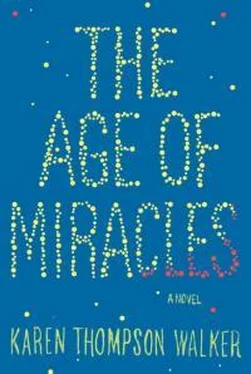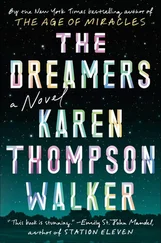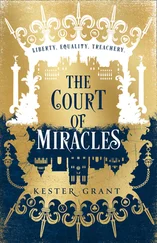Chip was a neighbor of his, a teenager who helped keep the house going. Chip wore black T-shirts and black jeans every day, and a lip ring was responsible for the slight drooping of his lower lip. They were an unlikely pair, but I think Chip hated the development as much as my grandfather did, though he lived with his parents in one of the new houses.
“This is bullshit, anyway,” said my grandfather.
“What is?” asked my mother.
“I figure it’s all a trick to take our minds off the Middle East.”
He had the palest blue eyes, like my father’s but lighter, and they seemed to be fading as he aged, like fabric left too long in the sun. A few wisps of white hair fell now and then on his forehead.
“Come on, Gene,” said my mother. “How could someone rig all this?”
“I’m just saying, how do you know it’s true? Have you measured it? They can do anything these days.”
“Gene—”
“You just wait. They’ve got something cooked up. That’s all I know. They’re messing with the clocks or some damn thing. I’m just saying I don’t believe it. I don’t believe it for a second.”
My mother’s cell phone buzzed, and I could tell from the way she answered that it was my father on the other end. She stepped outside to talk. I sat down at the table—this was the same table where my grandfather and I used to play hours of Old Maid together, but his eyesight had grown too poor to see what kind of cards he held. I missed how he used to be.
“So, Julia,” said my grandfather. “You see anything around here you want?”
He waved at his shelves of antique glass, his rows of weathered hundred-year-old Coke bottles, my grandmother’s silver tea service, her collections of decorative thimbles and tiny silver spoons, the pewter and porcelain figurines she had arranged on lace doilies in some different, better decade.
“I can’t take it with me, you know,” he went on. “You should take what you want now, because when I’m dead, Ruth is going to try to get her hands on everything.”
Ruth was my grandmother’s younger sister. She lived on the East Coast.
“No, thanks, Grandpa,” I said. I hoped he wouldn’t notice that I wasn’t wearing my gold nugget necklace. “You should keep your stuff.”
Before the arthritis, he used to spend his mornings at the beach running a metal detector over the sand, hunting for coins and treasure in the dunes. But now he’d grown eager to hand off his things, as if the weight of his possessions kept him tethered to this earth and, by giving them away, he could snip those strings.
He stood up from his chair and shuffled to the counter for another cup of coffee. He stood at the window. My mother was pacing out there, making hand motions while she talked on the phone. The wind was blowing her hair all to one side, and she kept brushing it out of her face.
“Did I ever tell you that I seen a guy killed out there in that yard once?”
“I don’t think so,” I said.
“He wasn’t more than seventeen,” he said, shaking his head. “A horse trampled right over top of him.”
“That’s terrible,” I said.
“It sure was.”
My grandfather nodded slightly as if to underline the thought. He had a vast memory for awful things. Somewhere farther back in the house, I could hear a faucet dripping.
“This whole thing reminds me of when I worked in Alaska,” he said. Alaska was one of his favorite subjects. “We had sun all day and all night in the summer. We had sun at two in the morning. The sun never went down. Not for weeks. And then in the winter, it was pitch-dark all day every day for two or three months.”
He trailed off. I noticed a television satellite wobbling on a nearby roof, barely visible through the pine trees. I could smell a hint of smoke in the air.
“This whole thing is bullshit, believe me,” he said. “I just can’t figure how.”
“You really think so?”
He looked at me with a serious, steady gaze.
“Do you know that in 1958 the United States government began running a secret nuclear test program right here in this county?” he said. “They were testing the effects of nuclear substances on regular people. They were putting uranium in the water and then monitoring the cancer rates. Have you ever heard that?”
I shook my head. Somewhere under his backyard, a bomb shelter lay abandoned. My grandfather had built it himself in the sixties.
“Of course you haven’t,” he said. “That’s the way they like it. That’s exactly how they like it.”
A gust of wind whooshed past the back of the house, carrying a paper bag past the window.
“Have your mother and dad been taking you to church?” he asked.
“We go sometimes,” I said.
“You should go every week,” he said. “Especially now.” He picked up a pair of tiny boots encased in a skin of tarnished silver. “You want these?”
“That’s okay,” I said.
“These were my shoes when I was four years old. Don’t you want anything around here?”
I could hear the labor of his lungs as he breathed, the sound of his air whistling through narrowing passageways.
“Wait a minute. I know what you’d like.” He pointed to a low cupboard on the far side of the kitchen and instructed me to kneel down on the floor. “Now reach all the way inside,” he directed. “Feel that?”
“What?”
I was up to my shoulder in the cupboard. The linoleum was pressing its paisley pattern uncomfortably into my kneecaps. But I wanted to please him, so I kept going.
“It’s a false back, see?” he said. “Slide it to the right.”
In my grandfather’s house, a cereal box was never full of cereal; soup cans almost always contained a substance more precious than soup. It’s no wonder he believed so fiercely in forces unseen. Behind the false back of the cupboard stood a row of coffee cans, so old I didn’t recognize the labels.
“The Folgers can,” he said. “Give it here.”
He pulled at the lid, wincing.
“Let me do it,” I said.
The lid came off easily in my hands, but I tried, for his sake, to make it look like a harder task than it was. The can was stuffed with layers of crumpled newspaper. At the bottom was a small silver box, inside of which, on a bed of stiff velvet, lay a tarnished gold pocket watch, its chain snaking around behind its face.
“This was my father’s,” he said. “You wind that up, and it’ll tell the time. It’ll last forever. Them gears are good quality. That’s how they used to make things, good quality, you know? I’ll bet you never even seen something as well made as that.”
I did not want the watch. I would only add it to the stack of other objects my grandfather had given me, all of them ancient and obscure: uncirculated commemorative silver dollars packed in plastic, four pairs of my grandmother’s clip-on earrings, framed maps of our city as it was a hundred years ago. But he insisted, and I couldn’t admit to him that I had lost the one heirloom of his that I really loved. That morning I had searched the dirt for my gold nugget necklace, but I couldn’t find where it had flung.
“Thanks,” I said, holding the watch in my hand. “It’s pretty.”
“Be even prettier once you shine it up,” he said. He rubbed the face with the cuff of his sweatshirt. “You take good care of that, Julia.”
The screen door slammed, and my mother came into the kitchen. She noticed the pocket watch in my hand. “Oh, Gene, don’t give away all your things.”
“Let her keep it,” he said. “I can’t take it with me.”
“You’re not going anywhere,” she said.
He waved her off.
“Take this, too,” he whispered to me as we were leaving. He handed me a ten-dollar bill. A quick smile flashed across my grandfather’s face, a rare and precious sight. I could see the outline of his false teeth against his gums.
Читать дальше












